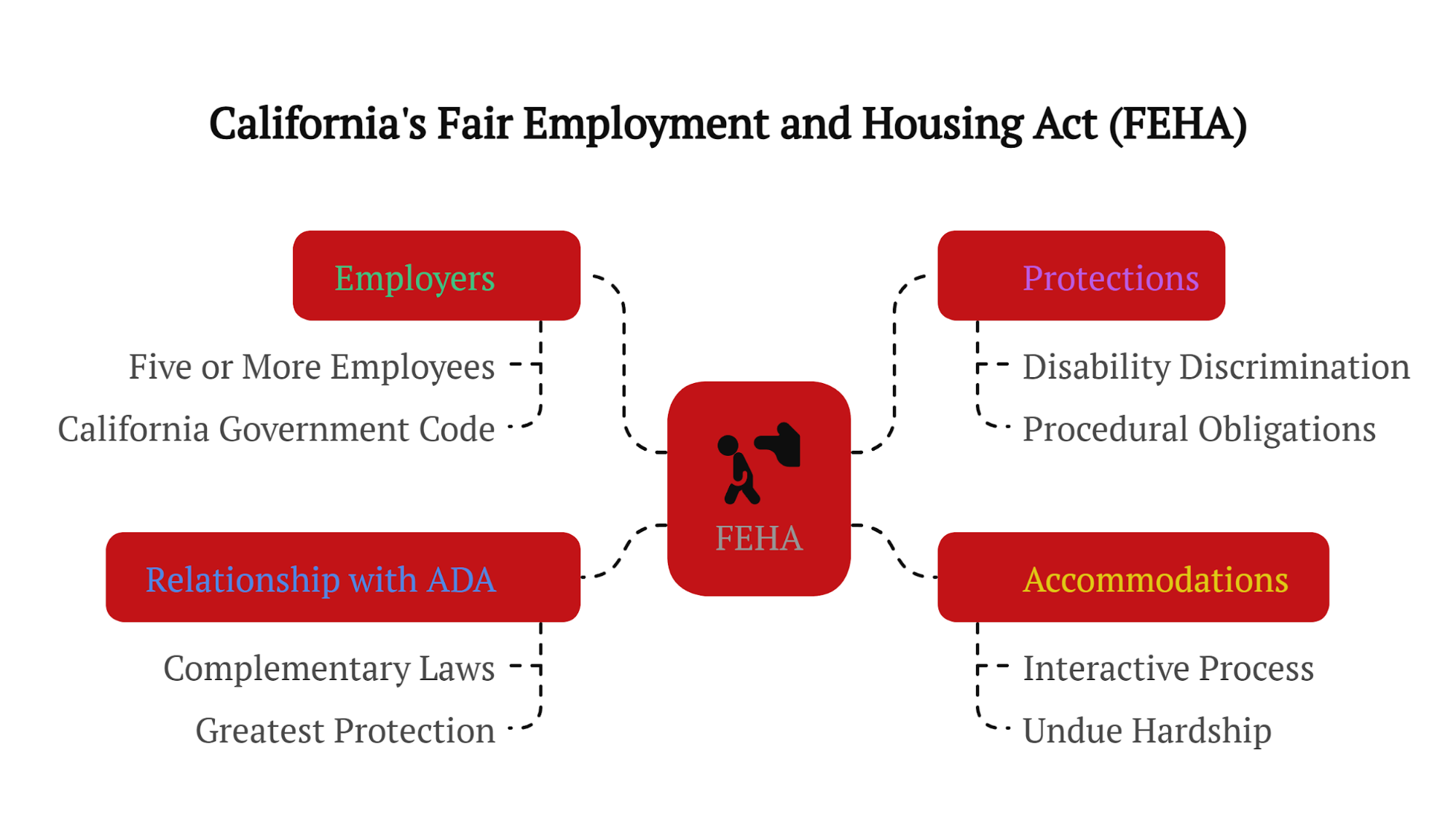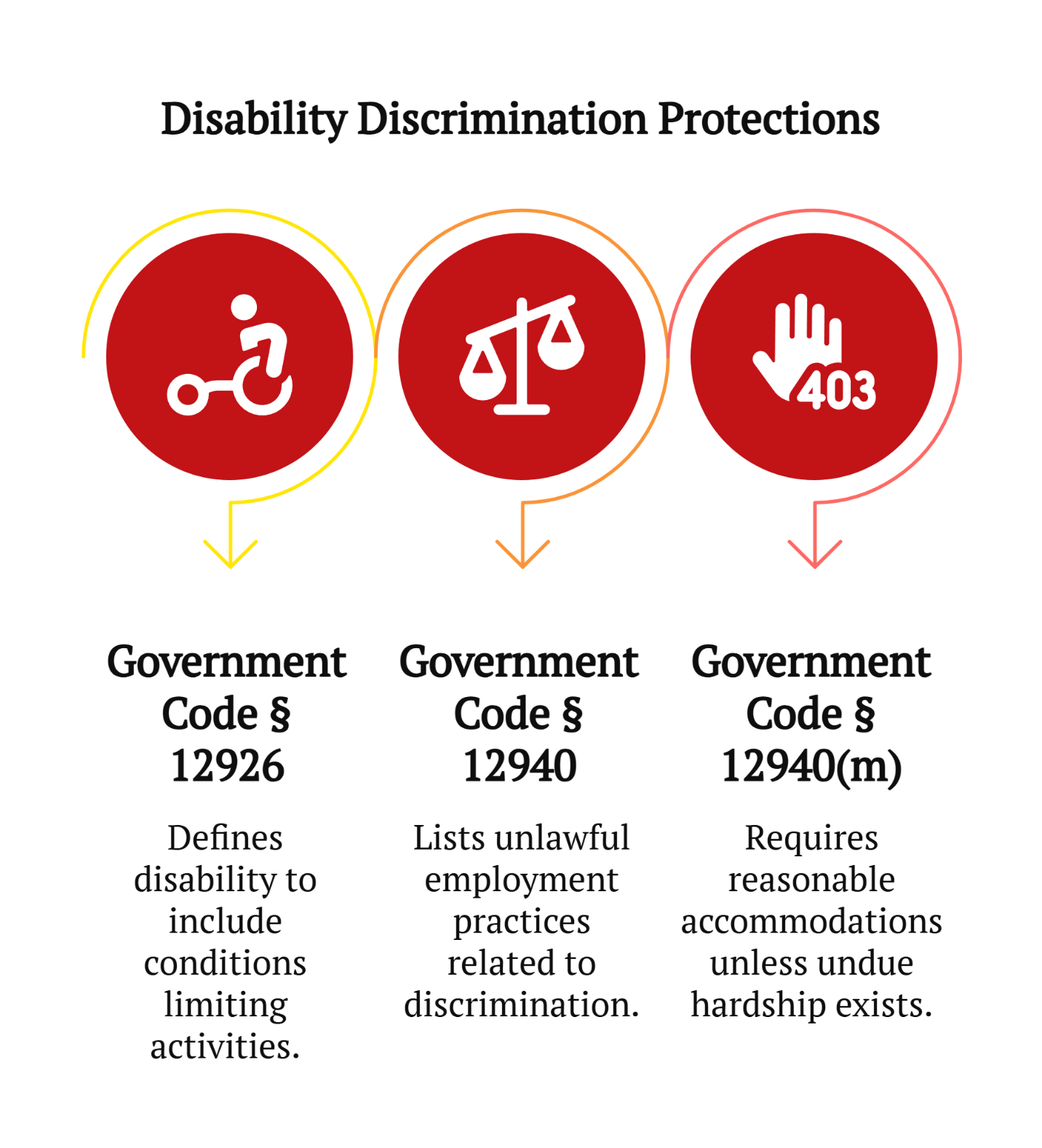📌 Key Takeaways
If you’ve faced job consequences after a back injury, understanding your legal rights could change everything.
FEHA Covers Back Injuries: Under California law, back injuries that limit major life activities qualify as protected disabilities requiring workplace accommodations.
Interactive Process Is Not Optional: Employers must engage in a good-faith, timely discussion about accommodations or risk violating Gov. Code § 12940(n).
Accommodation Denials Raise Legal Flags: Refusing reasonable modifications without demonstrating undue hardship may breach FEHA mandates under § 12940(m).
Documentation Strengthens Your Position: Preserving written communications, medical restrictions, and employer responses helps establish whether statutory violations occurred.
Timing Can Signal Retaliation: Terminations or negative treatment shortly after injury disclosures may indicate retaliatory motives subject to legal scrutiny.
Empowered employees ask the right questions—and know when to call a qualified employment attorney.
Identifying Disability Discrimination Under California Law
Back injuries are recognized as potential disabilities under California Government Code § 12926. California law defines a disability as a condition that limits major life activities, including lifting, walking, or working. An employee with a qualifying back injury may be protected by the Fair Employment and Housing Act (FEHA).
Disability discrimination occurs when an employer treats an employee unfavorably due to a protected medical condition. Conduct such as termination, demotion, or reassignment may qualify as an unlawful employment practice under FEHA. Unwelcome differential treatment based on an employee’s disability status may raise red flags about the employer’s compliance with California law.
California’s Fair Employment and Housing Act (FEHA) Statutory Framework

FEHA applies to employers with five or more employees in California. The statute—outlined in California Government Code §§ 12900–12996—provides specific protections against disability discrimination and requires employers to comply with clear procedural obligations.
Under California law, generally, an employer must engage in a timely, good-faith interactive process to determine whether reasonable accommodations are available. These accommodations are intended to help qualified individuals perform the essential functions of their position without imposing undue hardship on the employer.
FEHA protections are distinct from but complementary to the federal Americans with Disabilities Act (ADA). Where both laws apply, the statute offering the greatest level of protection to the employee is typically utilized.
Concrete Statutory Violations in Back Injury Discrimination Cases
Employers operating in physically demanding industries—such as construction, manufacturing, logistics, or healthcare—are more likely to face disability-related claims when they fail to accommodate work restrictions resulting from back injuries.
A failure to engage in the interactive process is a violation of California Government Code § 12940(n). Similarly, refusing to provide a reasonable accommodation, where one is available and does not impose an undue hardship, may violate § 12940(m).
Common patterns that may indicate statutory violations include:
- Terminating an employee shortly after medical leave related to a back injury
- Reassigning an employee to unfavorable duties without exploring accommodations
- Ignoring medical documentation or refusing to discuss modified work responsibilities
Retaliatory actions following a disability disclosure or accommodation request may also constitute separate violations under FEHA, particularly when they result in adverse employment consequences.
Evidence Documentation for Legal Violations
Documentation plays a crucial role in establishing whether a legal violation has occurred. Written communication between the employee and employer regarding medical restrictions or accommodation requests may support or undermine a claim.
Medical certifications outlining functional limitations can help demonstrate that the employee qualifies as disabled under California law. Retaining copies of accommodation requests, HR correspondence, and performance evaluations is essential for evidentiary purposes.
Temporal proximity between an injury-related disclosure and adverse employment action can provide circumstantial context, although such timing alone is insufficient to prove liability. A professional legal assessment is typically necessary to evaluate the overall strength of the evidence and determine whether it meets the threshold for a statutory violation.
Pre-Verified Legal Framework and Statutory Authority

The following statutory provisions form the core of California’s disability discrimination protections:
- Government Code § 12926: Defines “disability” to include physical and medical conditions that limit major life activities
- Government Code § 12940: Lists unlawful employment practices related to disability discrimination
- Government Code § 12940(m): Requires employers to reasonably accommodate employees with disabilities, barring undue hardship
These laws are subject to change. Statutory provisions should always be reviewed in their most current form and interpreted within the context of professionally guided legal evaluation.
Hypothetical Scenario (Informational Purposes Only)
This hypothetical situation is for informational purposes only.
A warehouse worker sustains a lower back injury and returns with a physician’s note restricting lifting over 15 pounds. The employer reassigns the worker to the original position without modification, then cites “non-performance” as the reason for termination. No conversation about alternative assignments or accommodations occurs.
In such a scenario, the employer’s actions may raise compliance concerns under California Government Code §§ 12940(m) and 12940(n), specifically regarding reasonable accommodation and the interactive process. Whether these actions meet the legal definition of discrimination would depend on a detailed evaluation of the facts, which must be conducted by a qualified employment law attorney.
Importance of Legal Consultation
Under California law, generally, evaluating whether an employee’s rights have been violated requires a detailed review by a professional experienced in employment law. Legal protections depend on the specific facts of each case, including timing, communications, medical documentation, and employer conduct.
If you believe you may have experienced disability-based discrimination in the workplace, contacting an experienced employment law attorney is a critical step toward understanding your rights. Only a licensed professional can assess whether the facts of your situation meet the legal criteria for a statutory violation.
Disclaimer:
This content is for informational purposes only. This content is not legal advice. No attorney-client relationship is formed through this content. Please consult a qualified attorney in your jurisdiction for legal advice specific to your situation.
Protect Your Rights | The Akopyan Law Firm, A.P.C. | Top Gun Employment Lawyers
Have you been wrongfully terminated from your job? Have you suffered discrimination, harassment, or retaliation in the workplace? Has your employer violated wage and hour laws? If so, we can help. The Akopyan Law Firm, A.P.C. is dedicated to protecting and enforcing employees’ rights throughout Southern California. With a 97% success rate and millions recovered for our clients, our team of experienced and talented employment lawyers can fight to secure the justice you deserve.
Take the First Step Towards Securing Justice: Call us today to speak with one of our experienced employment lawyers. The firm offers case evaluations free of charge.
Contact Us Today:
- Phone: (818) 509-9975
- Office Locations: Los Angeles, Bakersfield, Costa Mesa, Temecula, Rancho Cucamonga, Oxnard, Culver City, and San Diego in California.
Important: Contacting the Akopyan Law Firm, A.P.C. does not create an attorney-client relationship, but all communications will remain private and confidential. Each case is unique. The Akopyan Law Firm, A.P.C., does not guarantee any outcome.

